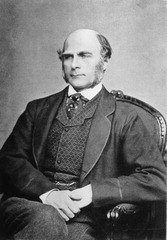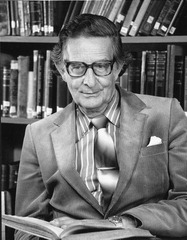Own family. Although a direct link between a figure's achievements and their own family and/or upbringing can only be identified for a relatively small number of our people on EPoCH, of course, our upbringing and family influence us all in some manner or other. Presumably, the socio-economic circumstances of a person's upbringing affect not only the opportunities afforded them, but also the experiences they bring to the study of psychology. As well as this, two quite different themes can be identified from the information provided for EPoCH: Having intellectual relatives. Intellectual relatives often open doors for contacts with the current 'leading lights'. For instance, William James' brother, the novelist Henry, settled in Britain, which not only enabled the younger William to continue to travel, but also to come into contact with contemporary European thinking. Indeed, James' family were all intellectual and his father took the children travelling and gave them an unusual and intellectual education. Similarly, Pierre Janet, the psychiatrist, was in contact throughout his career with many leading intellectuals living in metropolitan France, having many relatives, like the philosopher, Paul Janet, who were intellectuals and professional people. Indeed, the 'gentleman scientist' model that was widespread during the 19th Century may have attenuated the importance family had on an individual's own research. 'Gentlemen scientists' tended to come from relatively privileged families that had not only access to the material resources that are important to research, but also access to an intellectual environment that encouraged such activities. So it is hardly surprising that many of the early figures in EPoCH are either related (like Galton and Darwin), or had intellectual relatives in other fields (like James and Janet). Parental values and interests. For instance, Wundt is described as being a “serious and solitary child who spent most of his time studying”. His later capacity to work, and the approach he took, seems to have come from being born into a poor family of clergy and having a serious childhood.\nGail Goodman, who studies child witness testimony says: “My father, who revered science, was educated as an attorney. My mother, who grew up in an orphanage, knew all too well the meaning of child trauma. After graduating from UCLA, she became a teacher and child advocate. Given this familial history, perhaps my research and teaching interests come as no surprise”. Written by: Course Team 

Intelligence is a shorthand term covering a complex range of human capacities. There are no universally accepted definitions, but intelligence is generally taken to relate to factors such as the capacity to make sense of abstract ideas and to perceive patterns of complex relationships. There are many factors which relate to 'intelligence', such as capacity for insight into human relationships, verbal and numerical ability, non-verbal insights, 'motor intelligence' (such as ability to quickly master complex motor tasks like driving or tennis); 'emotional intelligence'; 'spiritual intelligence', and so on. A key assumption of many early workers in the field was that all such abilities factors simply reflected an underlying 'general intelligence'. Such a viewpoint would probably be seen as oversimplified these days. It is more likely that intelligence involves a constellation of partly interdependent factors, such as verbal and numerical ability, visuo-spatial ability, or visual pattern-recognition. 


